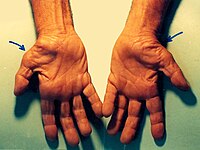
Photo from wikipedia
BACKGROUND Our study aims to evaluate the reliability of clinical findings in diagnosing carpal tunnel syndrome (CTS), with the help of nerve conduction studies (NCSs) and the detection of comorbidities… Click to show full abstract
BACKGROUND Our study aims to evaluate the reliability of clinical findings in diagnosing carpal tunnel syndrome (CTS), with the help of nerve conduction studies (NCSs) and the detection of comorbidities likely to be risk factors. METHODS 512 patients were included in the study who described pain or paresthesia in the median nerve sensory distribution. Sensory and motor NCSs were performed on the median and ulnar nerves of all patients. 49 patients who showed pathological abnormalities of the ulnar nerve were excluded. Demographic information, clinical findings and comorbidities were recorded. According to the results of the NCSs, the patients were divided and analyzed as either positive and negative for the diagnosis of CTS. RESULTS The highest sensitivity was seen from the Durkan test (95.6%) and the lowest was from thenar atrophy (22.1%). The highest specificity and positive predictive values were seen for thenar atrophy (100%) and the lowest were from the Tinel test (40.9% and 59.1%). The highest negative predictive value was the Durkan test (94%) and thenar atrophy was the lowest (57.4%). There was a significant difference in NCSs groups for clinical findings and comorbidities. CONCLUSIONS Thenar atrophy and sensory loss were highly specific in CTS but had limited value in early detection. Due to their low specificity, provocative tests do not appear sufficient enough to establish a definite CTS diagnosis. Only Durkan's test could possibly be considered initially as it has more balanced values. Diabetes, obesity, rheumatoid arthritis, hypothyroidism and gout significantly increase the risk of CTS.
Journal Title: Journal of Clinical Neuroscience
Year Published: 2019
Link to full text (if available)
Share on Social Media: Sign Up to like & get
recommendations!